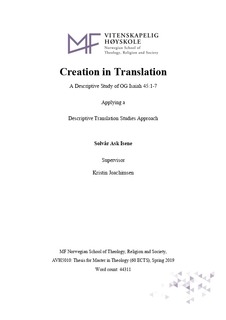Creation in Translation : A Descriptive Study of OG Isaiah 45:1-7 : Applying a Descriptive Translation Studies Approach
Abstract
In this thesis I analyze a passage from the Old Greek translation of Isaiah: Isaiah 45:1-7.
The choice of Isaiah 45 was motivated by a wish to study a text concerning creation, asking whether it is possible to glimpse a translator’s theology in the translation he has produced. The thesis starts with a selective survey of research on the Old Greek of Isaiah. The analysis is preceded by a presentation of the theoretical framework that is employed: Descriptive Translation Studies (DTS).
Within DTS a translation is seen as consisting of three interrelated dimensions; the product (the translated text), the process of translation (the translator’s methods) and the intended function of a translation in the target community. Such an analysis involves considering the translation’s relation to its parent text (Vorlage), and its acceptability as a (translated) text in the target language, and this is what I have done through a detailed analysis of each verse of the Greek passage, compared to a Hebrew text.
Since intertextual references can be seen as a literary device, and therefore contribute to the literary qualities of the translation (thereby increasing its acceptability), the analysis of the text is performed with attention to potential influences from other septuagintal passages.
My analysis of OG Isaiah 45:1-7, is primarily a study of the process and product of translation, giving less attention to the prospective function of the translation.
On the basis of my analysis, I abstract the norms that seem to have guided the translator as he translated this text. He seems to stay quite close to his source text, but is willing to both omit and add elements, and seems particularly creative when it comes to lexical choice. He does seem concerned with the stylistics of the text he produces. It is finally argued that it is possible to see a glimpse of the translator’s theology. The translation appears, even more than the source text, to focus on the Lord as the only God. Rather than a “creation-theology”, the passage seems to express a “creator-theology”.
